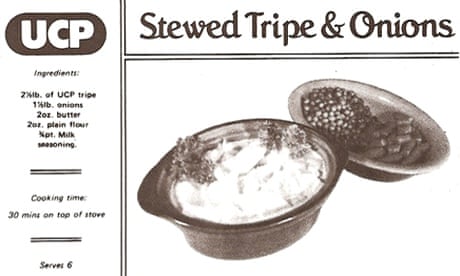Today I’m talking tripe. Literally. If two things were important to life in north-west England in the middle of the last century, they were the Manchester Guardian and the tripe industry. (Not necessarily in that order.) And a tongue-in-cheek remark by a reader set me off on a journey into the past exploring the links between them.
Responding to a column about our coverage of Islamic issues, the reader wrote: “The Guardian has form here. Its style guide in the 1960s instructed staff not to refer to Mecca as in ‘Ashton-under-Lyne is the Mecca of tripe eaters’ – though whether this was out of respect to Islam or the English language remained uncertain.”
In fact it was the 1950 Manchester Guardian stylebook (a revised version of the paper’s very first stylebook, published in 1929, when CP Scott was still the editor) that, in a section warning against “clichés, inappropriate and outworn metaphors” listed:
Mecca (as in “Ashton is the Mecca of tripe-eaters”)
The same volume, incidentally, warned against the use of such American vogue words as “teen-ager” and the disturbing recent tendency to call the telephone a “phone”.
As someone who spends much of my time trying to dissuade my colleagues from overusing the latest buzzwords and cliches – “gamechanging”, anyone? – I find it touching to think of my predecessor, 60 years ago, doing the same. And with as little effect, to judge by the fact that subsequent stylebooks found it necessary to reiterate the ban, although by 1969 it was listed under “words and phrases to be avoided”, thus:
Mecca: except for pilgrimages and dance halls
(Note to younger readers: Mecca Leisure Group ran nightclubs, dance and bingo halls, and was also involved in the Miss World competition through its high-profile boss, Eric Morley.)
By 2006, any reference to Mecca, tripe or Ashton-under-Lyne had mysteriously disappeared from the Guardian style guide, a fact lamented by my then colleague David McKie in a lovely article inspired by a visit to the town.
Having established that tripe was still available in the local market, he concluded: “So perhaps there’s still truth in the claim that Ashton is the Mecca of tripe-eaters. And since the old Manchester Guardian stylebook was long ago superseded, I think I am free to say so in this column without fear of rebuke or retribution.”
What was so special about Ashton-under-Lyne? I am indebted to a wonderful little book called Tripe: A Most Excellent Dish, by Marjory Houlihan (Prospect Books), a history and celebration of this once astonishingly popular offal. In the 1920s, Ashton, with a population of just over 40,000, boasted no fewer than 30 tripe dealers – one, Arnold & Hough, had eight shops and two market stalls. Bolton, admittedly much bigger, had 76 tripe outlets but “Bolton is a Mecca for tripe-eaters” is somehow less evocative.
Mecca was reinstated (by me) in the 2007 style guide in its current form, differentiating between the Saudi holy city, with a capital M, and metaphorical use of the word, in lowercase:
Mecca: holy city in Saudi Arabia
mecca: as in “Ashton-under-Lyne is a mecca for tripe-eaters”
The use of “mecca” to mean “a place regarded as supremely sacred or valuable”, or more generally “a place which attracts people of a particular group or with a particular interest” (OED) dates back to the early 19th century and was first applied, by the medical journal the Lancet, to Edinburgh, to which “studious pilgrims should resort to drink of the pure springs of knowledge”.
My colleagues seem to enjoy using the word in this way. In the past month alone, we have written about a bookshop in Oswestry that is “a mecca for book lovers”; described Dreamland, in Margate, as “the Kent coast’s kiss-me-quick mecca of pleasure without measure”; discussed whether Scotland’s reputation as a “global mecca of the socially progressive” is justified; and reflected on the connection between the film Jaws and the “urban meccas” of US shopping malls in the 1970s.
He might be dismayed to see the cliche still in use, but I like to think that the editor of the 1950 stylebook would join me in celebrating the fact that, while the tripe shops may have gone, the link between Ashton-under-Lyne, tripe, Mecca and the Guardian lives on.
